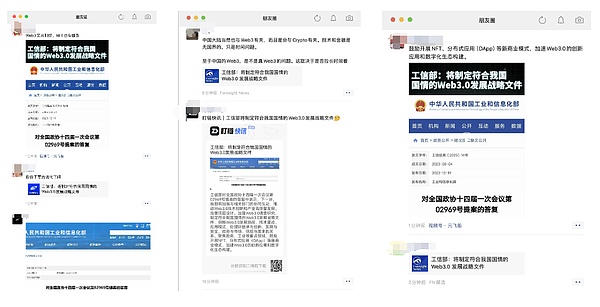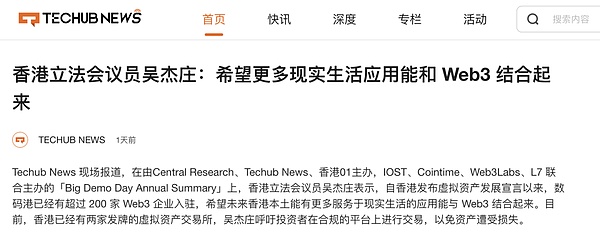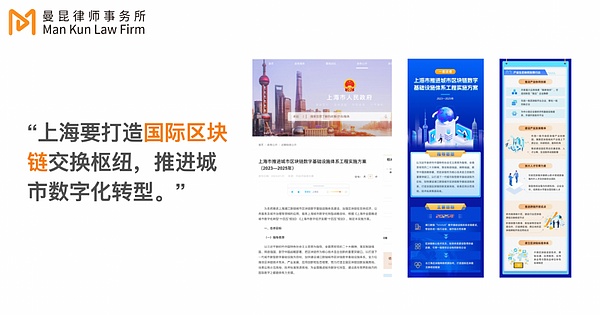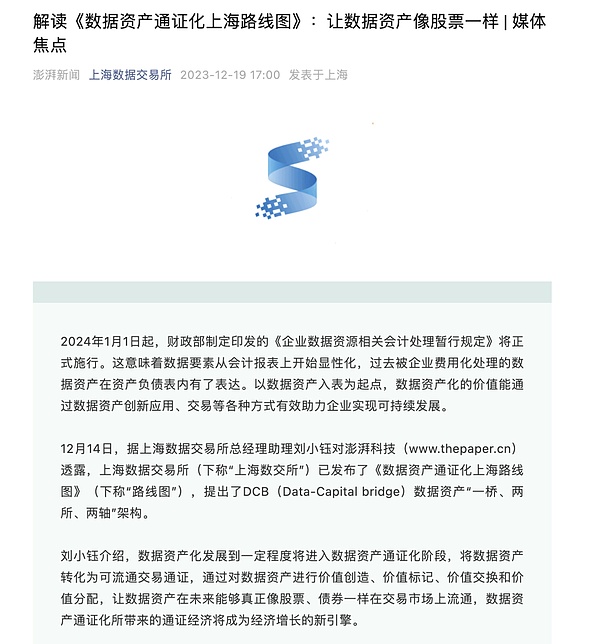Source: Lawyer Liu Honglin
01 ChinaThe Spring of Blockchain ?
Friends in the overseas currency circle are "rebellious" and think about decentralization every day; friends in the Chinese chain circle are upright and always respond to the national development strategy and keep up with the times.
No, yesterday the Ministry of Industry and Information Technology released a news reply on its official website, which almost made friends in the entire circle have a climax and expressed that they must keep up with the times. You can feel the lawyer Honglin’s friend this morning. lock up.

There is no doubt that news like this has great impact on the blockchain in mainland China. This is definitely a good thing for practitioners and friends who start a business. After all, engaging in blockchain means engaging in fraud. This is a misunderstanding and prejudice that many friends who do not understand this industry can easily have.
However (note this but), does this opinion reply from the Ministry of Industry and Information Technology mean that virtual currencies are legal in the country, and does it mean that coins can be issued casually in China? That's not the case.
In this article, let’s take a look at what the Ministry of Industry and Information Technology believes Web 3.0 should look like in line with China’s national conditions, and what path we should take as entrepreneurs. After all, only in the right direction can we get twice the result with half the effort. .
02 Interpretation one by one
To be on the safe side, I went to the Ministry of Industry and Information Technology The official website has searched for relevant sources (response to Proposal No. 02969 of the First Session of the 14th CPPCC National Committee), and we will interpret it one by one.

Point 1
Member Wu Jiezhuang:
I have received your "Proposal on Promoting the Development of the Web3 Industry"...
1. The Ministry of Industry and Information Technology is responding to Member Wu Jiezhuang. Friends outside the circle may not be familiar with it, but Committee Member Wu can be said to be an old friend in the currency circle. He is often active in Web3.0 activities in Hong Kong and Mainland China, and makes some remarks that are popular among people in the currency circle. Although he is a member of the Hong Kong Legislative Council, he looks like the director of the Hong Kong Blockchain Investment Promotion Bureau. If you don’t believe it, you can feel it:


Point 2
The Ministry of Science and Technology, Chinese Academy of Sciences, and China Association for Science and Technology, hereby reply as follows:
p>
Our Ministry attaches great importance to the development of the Web3.0 industry. Your suggestions on strengthening resource support for Web3.0 technology research and development, strengthening technical supervision and management, encouraging international cooperation, and strengthening publicity and promotion are forward-looking and strategic, and are highly consistent with the key tasks of our ministry.
2. In this response, the Ministry of Industry and Information Technology has joined forces with the Ministry of Science and Technology, the Chinese Academy of Sciences, and the China Association for Science and Technology to speak out. What can be interpreted about these institutions? Lawyer Honglin’s point of view is: It will benefit Web3.0 entrepreneurs.
Why do you say that? Friends who often want to apply for government financial subsidies and project declarations know that there are three main government departments in China that provide money to startup companies: Science and Technology Commission (Science and Technology Commission), Economic and Information Technology Commission (Economy and Information Technology Commission) and National Development and Reform Commission (National Development and Reform Commission). Development and Reform Commission).
Every year, the Ministry of Science and Technology takes the lead in organizing innovation and entrepreneurship competitions, ranging from local competitions to national selections. The advantages of Science and Technology Committee bonuses are: large amounts and low thresholds. Taking Shanghai as an example, the finalist at the city level is basically a base bonus of 200,000 yuan. Moreover, judging from Lawyer Honglin’s previous experience in winning awards, it is relatively easy to apply for awards related to the Science and Technology Commission.
The Economic and Information Technology Commission is the corresponding functional agency of the Ministry of Industry and Information Technology at the provincial level. The annual special support funds for entrepreneurship are more intense than those of the Science and Technology Commission, and there are special policies for different sub-industries, such as for For the film and television culture industry and for the tourism industry. Taking Shanghai as an example, a single support fund from the Economic and Information Technology Commission can reach millions.
Friends who start a business know that China’s industrial policy has always been local response to the central government. Since the corresponding competent authorities have stated that they want to support Web3.0, the relevant local departments must actively implement and respond to it. . This is also the reason why I said it is good for Web3.0 entrepreneurs.
Point 3
1. Work carried out
Currently, China is developing Web3.0 my country has a good industrial foundation and broad development space, especially its policy environment, technological reserves and rich application scenarios, which are my country's unique advantages.
(1) The policy environment is continuously optimized
Our Ministry and the Cyberspace Administration of China jointly issued the "Guiding Opinions on Accelerating the Application of Blockchain Technology and Industrial Development" and "Blockchain Information Services" Management Regulations" and a series of policy documents. Together with the National Standardization Committee, the National Blockchain and Distributed Accounting Technology Standardization Technical Committee (TC590) was established to provide a good development environment for Web3.0 based on blockchain technology. Promote all localities to release special policies such as the "Work Plan on Promoting the Innovation and Development of Beijing's Internet 3.0 Industry (2023-2025)" and "Shanghai Action Plan for Cultivating a New Track in the "Yuanverse" (2022-2025)" to seize the opportunity to seize Web3 .0 new opportunities for development.
(2) Technology exploration continues to deepen
Relevant research institutions actively track the international layout and development, and carry out Web3.0, Metaverse, non-fungible tokens (NFT), etc. Research on relevant emerging concepts, explore the implementation paths and application scenarios of technologies such as decentralized identity management and virtual digital humans, and evaluate expected risks and countermeasures. A number of independent and controllable alliance chain underlying platforms, represented by Changan Chain, Ant Chain, Huawei Cloud Blockchain, Baidu Super Chain, and Quchain, have been formed. For example: Changan Chain promotes technology iterative upgrades through open source and open methods, gathering more than 50,000 developers, releasing a total of 15 versions, and developing more than 120 industry ecological partners.
(3) Application cultivation is accelerated
my country’s Web3.0 application scenarios cover industry, medical care, education, tourism and other fields. Internet companies rely on their own technology and industrial advantages to launch a large number of digital Collections, metaverse space and other related products strive to seize the opportunity in the digitalization process. The Cyberspace Administration of China, together with the Propaganda Department of the Central Committee, the Supreme People's Court and other departments, organized and carried out national blockchain innovative application pilot actions, forming typical cases and experiences that can be replicated and promoted in 16 characteristic fields such as energy, rule of law, copyright, and trade finance. practice. In addition, our ministry supports the establishment of a number of data trading institutions such as the Beijing International Big Data Exchange and the Shanghai Data Exchange, which provide a "testing ground" for exploring changes in Web3.0 data element rules.
(4) Standard development is steadily promoted
Promote the establishment of the National Blockchain and Distributed Accounting Technology Standardization Technical Committee (TC590), and promote the release of the first domestic blockchain technology field The national standard "Blockchain and Distributed Accounting Technology Reference Architecture" standardizes the functional architecture and core elements of the blockchain system. It provides services for unifying the concept of blockchain, building and improving the blockchain system, and choosing to use blockchain services. Reference Guide. Establish working groups in international standardization organizations such as ISO/TC307, ITU-T, IEEE-SA, etc. to collaboratively promote the development of international standards and domestic standards, and advance industry standards and group standards work simultaneously and orderly.
3. At the beginning of the reply, the Ministry of Industry and Information Technology listed a series of its own workload proofs, ranging from industry standard policy formulation, technology exploration and application cultivation, etc., and also expressed its support for various projects under the banner of Web3.0. This kind of innovation means that I have been paying attention to it, such as digital collections, virtual digital people, etc., so entrepreneurs, please don’t mess around.
There are two points that the Ministry of Industry and Information Technology has focused on in the past. The first point is: the "autonomous and controllable alliance chain" that focuses on technology; the second point is: focusing on industry in terms of application. , tourism and copyright application scenarios. It can be seen that the Ministry of Industry and Information Technology’s attention and exploration of blockchain technology are still focused on the scope of industrial digitalization, and are not attempts in RWA, green bonds, digital finance and other fields. That is the division of labor and mission of Hong Kong, China, and there is a division of labor both internally and externally.
Point 4
In the next step, in response to your suggestions, our ministry will strengthen collaborative interaction with relevant departments to promote Web3.0 technology innovation and High-quality industrial development.
First, improve the top-level design. Strengthen the investigation and research of Web3.0, formulate a Web3.0 development strategy document that is in line with my country's national conditions, clarify the development path, technical focus, and application model of Web3.0, and properly handle the issues of inheritance and innovation, development and security, government and market, and supply and demand. relation.
4. Regarding the future development direction of China’s blockchain, the Ministry of Industry and Information Technology’s key work direction is to “formulate a Web 3.0 development strategy that is consistent with my country’s national conditions.” The focus is on government affairs and industry. We can see this from the ambitions of the Shanghai Municipal Government this month. The "Pujiang Digital Chain", which focuses on the digitalization of government affairs, will build Shanghai into an international blockchain exchange hub and promote the city's digital transformation.

What inspiration does this have for our entrepreneurs? Copy the homework and migrate Shanghai’s digital government services based on blockchain technology to other emerging cities. This is a new To G business, with new ideas, great achievements, and quite high engineering costs.
Point 5
Focus on key areas such as government affairs and industry, encourage the development of new business models such as NFT and distributed applications (DApp), and accelerate Web3.0 innovative applications and digital ecosystem construction.
5. The introduction of NFT has excited many domestic digital collection entrepreneurs. My point of view is: this is definitely a good thing for the domestic digital collection industry. This is because I can now legitimately use NFT to call my entrepreneurial projects, and there are no policy concerns. But this does not mean that NFT can do something special. The secondary trading market can be speculated at will. More importantly, how to make NFT get rid of the development status of just a small picture is what industry entrepreneurs should pay attention to. The problem to be solved has nothing to do with policy.
In addition, I am very curious about how the Ministry of Industry and Information Technology will understand new business models such as distributed applications (DApps)? Is it the distributed data storage at the bottom of the APP, or the ecological co-construction of commercial interests at the upper level? This is a good question. Normally, new business models will redistribute interests in the industrial chain. As for what kind of redistribution is based on blockchain, we can only wait and see.
Point 6
The second is to strengthen technical research and supervision. Support enterprises, universities, and research institutions to carry out research on the Web 3.0 technology system and achieve breakthroughs in key core technologies in cross-chain, privacy computing, smart contracts, etc. Deploy research on blockchain security supervision and governance technology, conduct research on alliance chain technology convergence and cross-chain mutual recognition, and explore a blockchain technology architecture that takes into account the open characteristics of the public chain and the easy supervision characteristics of the alliance chain. Increase support for the research and development of data security products, strengthen network product security vulnerability management, and improve network and data security protection capabilities in the development of Web 3.0.
6. It is affirmative to encourage and supervise in parallel, especially under the premise that it is in line with China’s national conditions. "A blockchain technology architecture that takes into account the openness of the public chain and the easy supervision of the alliance chain" is China's requirement for "blockchain" with Chinese characteristics. To be honest, when I saw this, my first reaction was, This matter almost refers to the Chinese public chain Conflux tree map chain or the open consortium chain BSN by name.
The implication is that a public chain with completely free entry and exit is not in line with China’s national conditions. Traditional public chains represented by Ethereum can be said to have basically no chance in mainland China. Why? Because Xiao V and others are disobedient and disobedient.
Point 7
The third is to carry out international exchanges and cooperation. Closely follow the latest trends in Web 3.0 from the international political, industry, academic and research circles. Encourage scientific research institutes, universities, enterprises, etc. to participate in Web3.0-related global standardization activities, promote participation in and lead the formulation of Web3.0-related international standards, de facto standards, and international alliance standards, and enhance the international voice and rule-making power. Accelerate the cultivation of compound talents, cultivate high-end talents with innovative abilities, and build a high-level talent team.
7. For researchers from Chinese universities, they can prepare to apply for blockchain-related research projects. After all, "promoting Web3.0 academic progress and the application of technological achievements" is an important workload manifestation, which is more It is easy to get project funding. If you have friends from relevant universities who want to do research on the subject, please contact Lawyer Honglin. We will be happy to participate.
Point 8
The fourth is to increase technology publicity and promotion. Build and make good use of existing science popularization platform resources, and continue to improve the public's understanding and awareness of Web3.0 technology through the dissemination of science popularization China and other official new media platforms.
8. The living situation of blockchain self-media may get better in the future. I won’t say that sensitive words such as blockchain will be restricted and banned. Industry practitioners may also be banned from WeChat for a few days. Of course, this is just an interpretation based on this policy. As for whether the respective media platforms will hold themselves to higher standards, it’s really hard to say.
Point 9
Promote application pilots such as distributed digital identity (DID), and explore Web3.0 digital identity authentication and digital asset management for institutions and individuals system.
9. There is one item in the promotion highlight project that requires special attention, which is the promotion of distributed digital identity (DID). Some time ago, friends from BSN invited me to participate in their offline forum in Beijing. The core theme was DID. There are two perspectives to understand this matter. One perspective is to create the identity of an individual citizen on the Internet. One account can be used throughout the entire network, which is conducive to personal data security and privacy protection. The other perspective is that as an Internet user, you only have one Identity, what you do on the Internet, can be traced through the blockchain records. I wonder what perspective everyone will use to interpret this? I hope my understanding is superficial.
Point 10
Establish a data governance and transaction circulation mechanism to form a typical demonstration project that can be replicated and promoted. Promote the academic progress and application of technological achievements of Web3.0, build a technology and industrial application exchange platform, and promote the innovation and development of Web3.0 industry.
10. "Digital asset management system and transaction circulation mechanism" are also the next key promotion matters of the Ministry of Industry and Information Technology. This refers to the data trading platform represented by Shanghai Digital Exchange. Data is a factor of production, and data can Integrated into a company's balance sheet, the data can be legally traded in the market. This is the general trend of data capitalization in China. Coincidentally, just yesterday, the Shanghai Digital Exchange published an article, which probably means making data assets like stocks. I don’t know if it can be done. Who can participate in the transaction of data? Once the transaction is completed, whether ordinary citizens, as owners of the data, can enjoy the relevant benefits, these are all good questions. Not much else to say, let’s just hope that: I hope that the data assets behind this stock will not be stuck at 3,000 points like A shares.

 Weatherly
Weatherly










